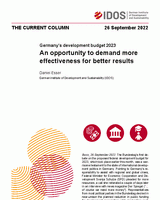Germany’s development budget 2023
An opportunity to demand more effectiveness for better results
Esser, DanielThe Current Column (2022)
Bonn: German Institute of Development and Sustainability (IDOS), The Current Column of 26 September 2022
The Bundestag’s first debate on the proposed federal development budget for 2023, which took place earlier this month, was a worrisome testament to the state of international development politics in Germany. Pointing to Germany’s responsibility to assist with regional and global crises, Federal Minister for Economic Cooperation and Development Svenja Schulze (SPD) pleaded for more resources, a call she reiterated a couple of days later in an interview with news magazine Der Spiegel (“… of course we need more money”). Representatives from most political parties in the Bundestag decried in near-unison the planned reduction in public funding for development cooperation while lambasting each other for adhering to false priorities. No matter whether they advocated for Schulze’s trademark “feminist” agenda, global food security or the protection of biodiversity, all but one remained mute on the question of development effectiveness.
Over twenty years ago, governments around the world reached a policy milestone: they acknowledged that more development aid alone would not be enough to improve the lives of billions in the Global South. The 2002 Monterrey Consensus became a solid foundation for a revised understanding of international development cooperation in the new millennium, one that prioritized effectiveness and impact over the sheer volume of monetary commitments by bilateral and multilateral donors. It served as a building block for a landmark international declaration proclaimed three years later in Paris whose signatories recognized key principles for development aid to produce greater impact. Results, not inputs, ought to be the ultimate measure of success for international development cooperation. This requires that donors look beyond budgets and commit to getting better at what they do. Now is the time to remember this crucial international consensus.
In the face of a looming ten-percent reduction totaling 1.27 billion EUR, reembracing an orientation toward impact holds the key to Germany living up to its aspirations as a reliable partner and thought leader in international development cooperation. The argument invoked by many in the Bundestag that dwindling amounts send a troubling signal to other G7 members tells only part of the truth. It foregrounds international visibility: the desire to convert national public funding into global political purchase. Yet it fails to acknowledge what the Organisation for Economic Co-operation and Development (OECD) and the German Institute for Development Evaluation (DEval) have been flagging for years: that Germany’s development system suffers from effectiveness problems.
Improving effectiveness as an opportunity
A focus on fostering organizational learning and thus improving the efficacy of its technical and financial cooperation can help sustain Germany’s impact in times of fiscal pressure. If successful, this course of action would build a stronger case for increasing the development budget again in future years. It would also help position Germany as an international agenda-setter instead of bankrolling multilateral priorities.
Achieving more with less is undoubtedly a tough charge. For decades, successive German governments have sought to implement political ideas and special initiatives by funneling billions of taxpayer Euros through two partially state-owned entities: GIZ and KfW. Running projects in over a hundred partner countries, these two principal actors in German bilateral development cooperation have amassed a wealth of experience. It is time for them to leverage this expertise and draw on international evidence of what works to implement better – not simply larger – commissions. Of course, it is unrealistic to expect GIZ and KfW to be advocates for austerity of their own volition. Yet corporate interests must come second. The planned reductions in Germany’s development budget constitute a challenge, but they are also an opportunity to revisit existing approaches with a view to getting more impact out of every Euro spent.
Those ready to join forces to increase the quality of German development cooperation have a plethora of rigorous evidence and recommendations to consider. In addition to in-depth reports by the OECD, DEval and a 2021 review by the Federal Court of Auditors (BRH), there are online databases outlining the findings of thousands of studies of interventions’ effects. Integrating this knowledge into the design of bilateral projects and multilateral partnerships in a more systematic manner has the potential to position Germany at the forefront of evidence-oriented development cooperation. The data are available. What has been lacking for years is domestic political demand for development effectiveness. This, therefore, is how Members of the Bundestag could make a real difference in the lives of billions: by asking Minister Schulze to prioritize those projects and partnerships that are demonstrably the most effective.

